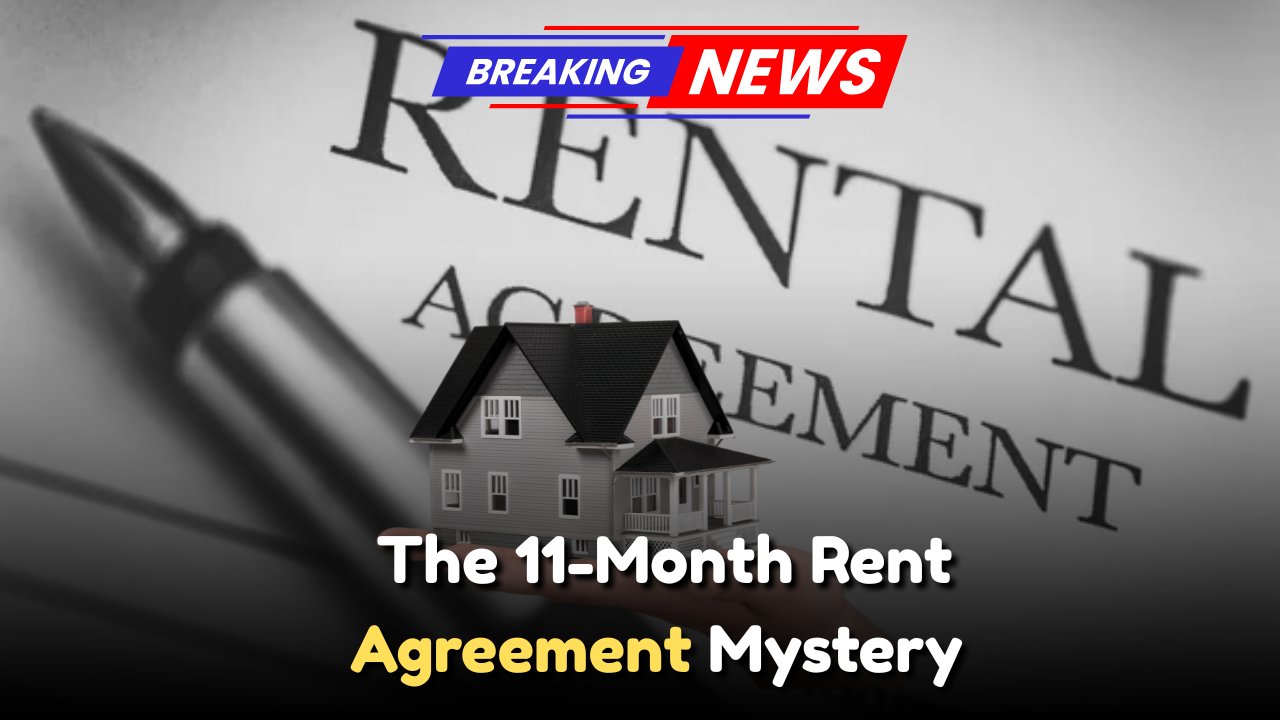Rent Agreement Rule : If you’ve ever rented a home in India, you’ve likely noticed a common pattern – rent agreements are typically made for only 11 months. But why not 12 months or more? Is this just a tradition or is there a legal reason behind it? This seemingly minor detail has significant implications for both landlords and tenants. In this article, we’ll break down the legal, financial, and practical reasons why rent agreements in India are usually limited to 11 months.
Understanding the Legal Structure of Rent Agreement Rule
A rent agreement is a legal contract between a landlord and tenant, outlining the terms of rental, including rent amount, duration, and obligations. However, the reason why it’s almost always for 11 months lies deep within the Indian legal system.
Key Reasons Why Rent Agreements Are Limited to 11 Months
- Avoidance of Rent Control Laws: Agreements longer than 11 months often come under the purview of rent control laws, which can limit the landlord’s ability to increase rent or evict tenants.
- Stamp Duty Implications: Lease agreements above 11 months must be registered, leading to higher stamp duty and registration charges.
- Legal Complexity: Registering a lease creates a long-term legal liability and obligations for both parties.
- Easier Termination: Shorter agreements give flexibility to renegotiate terms or terminate the contract.
- Speed and Convenience: Non-registered agreements are quicker to execute, saving time and legal formalities.
How Rent Control Laws Impact Landlords and Tenants
Rent control laws in India aim to protect tenants from arbitrary rent hikes and unfair eviction. However, they can be restrictive for landlords who want to adjust rent based on market conditions. Here’s how they impact both parties:
| Aspect | Under Rent Control Laws | Under 11-Month Agreement |
|---|---|---|
| Rent Hike | Capped by law | Negotiable annually |
| Eviction | Strict rules, court process | Easier after term ends |
| Legal Dispute Resolution | Through rent controller | Civil courts or mutual terms |
| Registration Required | Yes | Not mandatory |
| Flexibility | Low | High |
| Stamp Duty | Higher | Lower |
| Security Deposit Limit | May be regulated | Negotiable |
What the Law Says About Lease Registration
As per Section 17 of the Registration Act, 1908, any rental agreement that is made for more than 11 months must be compulsorily registered with the local sub-registrar’s office. This includes paying stamp duty based on the total rent and security deposit amount.
- Stamp duty ranges between 1% to 2% of the total annual rent.
- Registration charges may vary by state.
- Non-registration makes the agreement inadmissible in court in case of dispute.
Pros and Cons of 11-Month Agreements for Tenants
Pros:
- Less upfront cost due to no registration.
- Greater flexibility to move or renegotiate.
- Faster agreement process.
Cons:
- Less legal protection if disputes arise.
- Renewal needed each year, which could lead to rent hikes.
- In some cities, police verification may still be required.
Key Differences Between Lease and Leave & License Agreements
| Feature | Lease Agreement | Leave & License Agreement |
|---|---|---|
| Duration | Often more than 1 year | Usually 11 months |
| Possession Rights | Tenant gets exclusive | Limited rights to licensee |
| Registration | Mandatory if over 11 mo | Not mandatory under 12 mo |
| Legal Standing | Stronger tenant rights | More balanced and flexible |
| Dispute Handling | Tenant-friendly courts | Easier termination process |
| Ownership Control | Reduces owner control | Owner retains more control |
Why Landlords Prefer 11-Month Contracts
- They avoid legal complexities and costly paperwork.
- Easier to evict non-cooperative tenants.
- Allows annual rent adjustments.
- Saves money on stamp duty and registration charges.
What Tenants Should Know Before Signing an 11-Month Rent Agreement
- Always get the agreement in writing, even if not registered.
- Ensure clauses regarding rent, deposit, termination, and maintenance are clear.
- Ask for police verification copy as it adds a layer of safety.
- Clarify renewal terms and future rent increase.
Important Points Tenants Must Not Ignore
- Take a signed copy of the agreement.
- Inspect the property and record existing damages.
- Keep rent payment records.
- Understand notice period clauses.
Sample Rent Agreement Table Format (Key Details to Include)
| Clause | Description |
|---|---|
| Tenant & Landlord Names | Full legal names with ID proof |
| Property Address | Complete residential address |
| Rent Amount | Monthly rent and due date |
| Security Deposit | Amount and refund condition |
| Agreement Duration | Start and end date |
| Maintenance Charges | Responsibility and mode of payment |
| Notice Period | Time required before termination |
| Termination Clause | Conditions under which agreement ends early |
The 11-month rent agreement format has become a legal and financial convenience for landlords and tenants alike in India. While it offers flexibility, it’s essential for tenants to be aware of its limitations in terms of legal protection. Always read the terms carefully and don’t hesitate to seek legal advice for high-value or long-term rentals.
